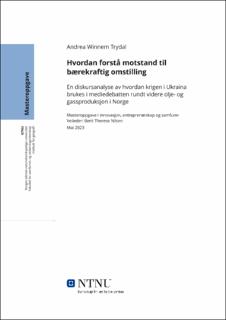| dc.contributor.advisor | Nilsen, Berit Therese | |
| dc.contributor.author | Trydal, Andrea Winnem | |
| dc.date.accessioned | 2023-07-20T17:21:21Z | |
| dc.date.available | 2023-07-20T17:21:21Z | |
| dc.date.issued | 2023 | |
| dc.identifier | no.ntnu:inspera:142265491:98277953 | |
| dc.identifier.uri | https://hdl.handle.net/11250/3080613 | |
| dc.description.abstract | I 2022 har nordmenn fått kjenne hvordan en krig i Europa påvirker økonomi, politikk og trygghet. Det har reist seg en debatt om energi- og klimakrisen som Europa og verden står overfor, hvor oljeproduksjonen i Norge står sentralt. Krigen har endret forutsetningene for videreføring av olje- og gassnæringen i Norge, og debatten i norsk media omhandler Norges fremtid som oljenasjon. Motstand til bærekraftig omstilling har også vist seg å være sentralt i debatten og det er store uenigheter om hvordan vi skal håndtere både energi- og klimakrisen samtidig. Formålet i denne masteroppgaven er å svare på følgende problemstilling:
Hvordan brukes krigen i Ukraina i argumentasjonen rundt olje- og gassproduksjonen i Norge?
Jeg har i tillegg benyttet to underspørsmål for å operasjonalisere hovedproblemstillingen. Disse spørsmålene går inn på hvilke argumenter og ståsted som er fremtredende i debatten, og jeg vil undersøke om det å være for videreføring av olje- og gassproduksjon i Norge er det samme som å være mot bærekraftig omstilling. Problemstillingen med tilhørende spørsmål vil bli besvart gjennom en diskursanalyse av 154 nyhetsartikler i norsk media. Jeg har identifisert to diskurser som jeg har tatt for meg, energi- og klimakrisediskursen, og motstand til bærekraftig omstilling-diskursen. De empiriske funnene diskuteres opp mot relevant teori og tidligere forskning fra samfunnsvitenskapen om omstilling og energipolitikk, miljødiskurser, kontroverser og sosial motstand. Denne litteraturen benyttes som grunnlag for å svare på problemstillingen.
Argumentasjonen for videreføring av olje- og gassproduksjon i Norge knyttes sterkt opp mot krigen i Ukraina og det er tydelig gjennom diskursene at Norges olje fremstilles som den mest bærekraftige oljen, og derfor bør benyttes. Det er uenighet om når Norge skal fase ut næringen og hvordan Norge skal håndtere energikrisen. Politikere har de tydeligste stemmene i diskursene og klimaaktivistene sørger for at klimakrisen ikke tilsidesettes i debatten og representerer miljøbevegelsen i diskursene. Det å være for videreføring av olje- og gassproduksjon er ikke det samme som å vise motstand til bærekraftig omstilling, men jeg har identifisert både direkte og indirekte motstand i diskursen som vil legge begrensninger på omstillingen. | |
| dc.description.abstract | In 2022, Norwegians have experienced how a war in Europe affects the economy, politics, and security. This has sparked a debate about the energy and climate crisis that Europe and the world are facing, where oil production in Norway is central. The war has changed the conditions for continuing the oil and gas industry in Norway, and the debate in the Norwegian media concerns Norway's future as an oil nation. Resistance to sustainable transformation has also proven to be central in the debate, and there are major disagreements about how to handle both the energy and climate crisis simultaneously. The purpose of this master's thesis is to answer the following research question:
How is the war in Ukraine used in the argumentation around oil and gas production in Norway?
In addition, I have used two sub-questions to operationalize the main research question. These questions investigate which arguments and positions that are prominent in the debate, and whether supporting the continuation of oil and gas production in Norway is the same as opposing sustainable transformation. The research question and associated questions will be answered through a discourse analysis of 154 news articles in Norwegian media. I have identified two discourses that I have examined, the climate and energy crises discourse and resistance to sustainable transformation discourse. The empirical findings are discussed in relation to relevant theory and previous research from the social sciences on transformation and energy policy, environmental discourses, controversies, and social resistance. This literature is used as a basis for answering my research question.
The argumentation for the continuation of oil and gas production in Norway is strongly linked to the war in Ukraine, and it is clear through the discourse that Norway's oil is presented as the most sustainable and should therefore be utilized. There is a disagreement on when Norway should phase out the industry and how Norway should handle the energy crisis. Politicians have the clearest voices in the discourses and climate activists ensure that the climate crisis is not sidelined in the debate and represent the environmental movement in the discourses. Supporting the continuation of oil and gas production is not the same as opposing sustainable transformation, but I have identified both direct and indirect resistance in the discourse that will limit the transformation. | |
| dc.language | nob | |
| dc.publisher | NTNU | |
| dc.title | Hvordan forstå motstand til bærekraftig omstilling | |
| dc.type | Master thesis | |
